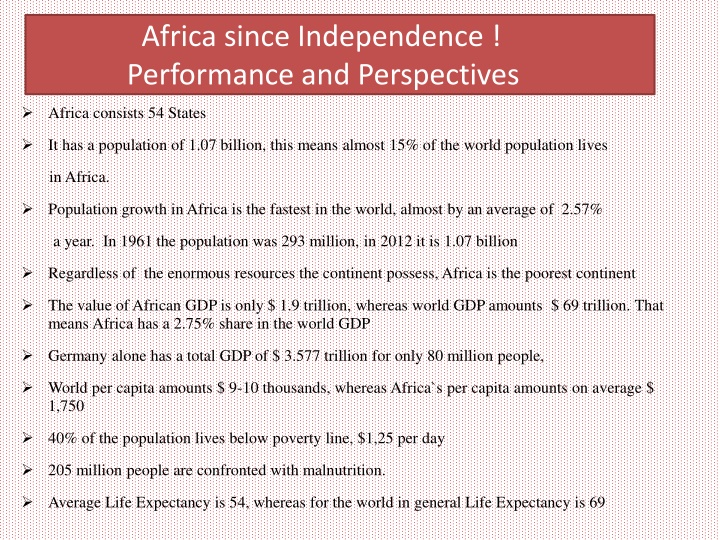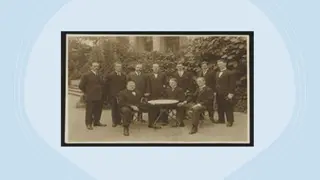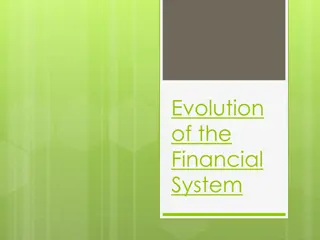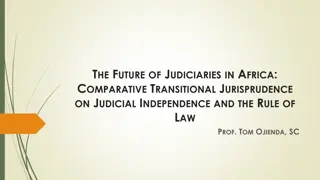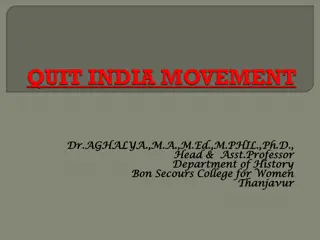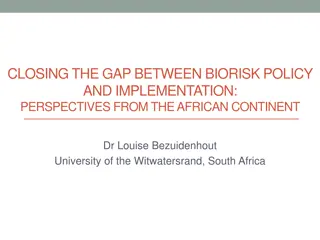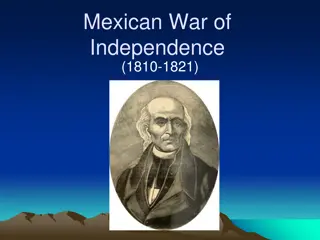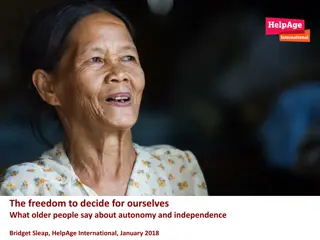Africa since Independence: Performance and Perspectives
Africa consists of 54 states with a population of 1.07 billion. Despite its vast resources, the continent faces challenges such as poverty, malnutrition, and low GDP. Explore the GDP growth and sectoral breakdown in sub-Saharan Africa from 1960 to 2010.
Download Presentation

Please find below an Image/Link to download the presentation.
The content on the website is provided AS IS for your information and personal use only. It may not be sold, licensed, or shared on other websites without obtaining consent from the author.If you encounter any issues during the download, it is possible that the publisher has removed the file from their server.
You are allowed to download the files provided on this website for personal or commercial use, subject to the condition that they are used lawfully. All files are the property of their respective owners.
The content on the website is provided AS IS for your information and personal use only. It may not be sold, licensed, or shared on other websites without obtaining consent from the author.
E N D
Presentation Transcript
Africa since Independence ! Performance and Perspectives Africa consists 54 States It has a population of 1.07 billion, this means almost 15% of the world population lives inAfrica. Population growth in Africa is the fastest in the world, almost by an average of 2.57% a year. In 1961 the population was 293 million, in 2012 it is 1.07 billion Regardless of the enormous resources the continent possess, Africa is the poorest continent The value of African GDP is only $ 1.9 trillion, whereas world GDP amounts $ 69 trillion. That means Africa has a 2.75% share in the world GDP Germany alone has a total GDP of $ 3.577 trillion for only 80 million people, World per capita amounts $ 9-10 thousands, whereas Africa`s per capita amounts on average $ 1,750 40% of the population lives below poverty line, $1,25 per day 205 million people are confronted with malnutrition. Average Life Expectancy is 54, whereas for the world in general Life Expectancy is 69
Africa`s main Problem ! GDP of sub-Saharan Africa by individual sectors In mil. $ 1960 1970 1980 1990 2000 2005 2010 Agriculture(constant 2000 $) 36 583 35 957 35 555 43 976 57 614 66 932 80 547 Fuels and raw materials( constant 2000 $) 17 018 38 226 45 273 53 442 61 013 82 255 105 433 Industry(constant 2000 $) 25 549 55 299 73 321 87 780 102 359 130 790 Manufacturing(constant 2000$) 8 531 17 073 28 048 34 338 41 36 48 535 Services(constant 2000 $) 35 588 67 654 99 810 122 883 157 471 199 294 161 141 55 708 309 074 Agriculture (current USD) 11 140 14 540 51 134 65 501 57 614 86 517 151 516 Fuels and raw materials(current USD) 5 182 11 098 54 663 54 224 61 013 146 005 Industry(current USD) 7 780 18 242 84 473 97 937 102 359 216 021 377 617 Manufacturing(current USD) 2 598 7 144 29 810 43 713 41 346 70 015 Services(current USD) 10 837 23 365 90 702 132 120 157 471 285 907 511 031 279 693 97 924 Source: WB, 2012
GDP Growth, 1960-1985(%) 9 8 7 6 5 Africa Americas 4 Asia 3 2 1 0 1960-1965 1966-1970 1971-1975 1976-1980 1981-1985
GDP Growth, 1985-1995(%) after SAPs Regime or Market Reform 7 6 5 4 1985-1990 1991-1995 3 2 1 0 Africa Americas Asia
Total debt to GDP, Ex. & debt service
Many African countries still depend on one or two commodities for their income. In 1960 nine commodities including coffee, cocoa, cotton, and sugar made up to 70 per cent of Sub- Saharan trade By 1980 & until now still constitute almost the same amount. Nigeria alone depends 95% on oil Almost all raw materials are exported without being processed and produced as finished products As a matter of fact the value-added chain which is very important for wealth creation, and nation building will be broken. Raw material prices fluctuate from time to time, and hence the trade balance of many African countries is venerable Raw material prices are being determined on the world market, and hence African countries cannot influence them. The terms of trade works against African countries- from 1986-1990 alone the continent has lost Ca. $ 50 billion Capital flight drains Africa`s wealth- French newspaper estimated that from 1989-1998 Nigerian leaders, Ibrahim Babangida and Sani Abacha accumulated in foreign banks ca. $ 8 billion. Samuel Do and Charles Taylor of Liberia almost $ 5 billion, Felix Houpouet-Boignyof Ivory Coast $6 billion, Mobutu of Zaire $ 5 billion In 2004 alone it was estimated that African leaders have accumulated ca. $ 140 billion in foreign banks. In other words, Africa borrows its own stolen money, and the money it has lost through unfair trade and the stolen money will be borrowed . For her stolen money she pays again interests and finances Europe.
Resources: Africa`s Natural Resources Oil in all Africa countries ca. 13% of world reserves Natural Gas all African countrie ca. 12% of world reserves (The biggest reserves is Nigeria) Coal (mainly in Botswana, Mozambique, Swaziland Zambia and Zimbabwe) Water Resources Iron Ore in all Africa without 1.54 billion ton South Africa(Angola, Gabon, Liberia, Mauretania & Zimbabwe ) Bauxite (Aluminum) Africa`s share in world production 8%, 2009 Guinea 26.6% of the world reserves Cameron 3.8% of the world reserves Copper Africa`s share in world production 9%, 2010 Zambia 8.9% of world reserves Congo (Zaire) 7.7 % of world reserves Steelpurifier (Titan) Sierra Leon 10.6% of world reserves South Africa 10.1 % of world reserves Cobalt Africa`s sharein world production 70%, 2010 Zambia 10.2 % of world reserves Congo(Zaire) 38.2% of world reserves Manganese Africa`s in world production 21%, 2009 Gabon 10.8% of world reserves South Africa 39.9 % of world reserves Tantalum Africa`s share in world production 25% Nigeria 4.3 % of world reserves Congo (Zaire) 7.8% of world reserves Diamond (Industrial) Africa`s share in world production 52.4% , 2009 Botswana 11.9% of world reserves Zaire 14.3% of world reserves South Africa 6.7% of world reserves Uranium Africa`s share in world production 17%, 2009 Gabon 1.4% of world reserves Niger 6.2 % or world reserves Gold Africa`s share in world production 22%, 2009 ca. 5.7 Billion t 40% of the world potential which can be used for hydroelectric energy
Why the Economic Policies did not work ? What went wrong in Africa over the last six decades? That is the first question we have to answer Since political independence many African countries went through different economic policies. Yet all the different policies did not help Africa to build a coherent economy which is based on science & technology Other countries like South Korea , and now China have managed to develop a coherent economy within 3 to 5 decades.
Is an imported model the main problem ? After independence almost all African countries have applied similar economic policy This policy is called import-substitution industrialization The aim of this policy was not to systematically industrialize the continent, but to satisfy the needs of a certain group As a matter of fact all the technologies and the spare-parts must be imported from outside This means that such an industrialization policy could not develop linkages, and cannot be the basis of a home market.
What is Import-Substitution-Industrialization ? Why many African countries must pursue this policy? In the 50s, it was assumed that many African countries posses the so-called traditional economy, mainly based on subsistence agriculture It was believed that the way out of such a backward economy is modernization Foreign experts had advised African governments to modernize their economy by adopting market economic instruments. This policy was not a holistic policy, but it was a top-down approach based on particular, and not interlinked projects. That means, it was assumed that through a trickle-down approach it is possible to modernize the entire economy. But due to the nature of the policy, and since it was not indigenously developed the policy did not bring the necessary results
Who benefited from such a policy ? From the name we can understand that every thing must be imported; the industries, raw materials, spare-parts and know-how. The policy was mainly designed to produce such kinds of products, like Coca Cola, Biscuits, Sugar, Shoe, Beverages, Textiles, Cigarettes etc. Do such kinds of products reflect the needs of the African people ? The answer is no ! Do such kinds of products help further industrialization ? The answer is no ! Only those who could afford can buy such kinds of products The most famous Egyptian Marxist economist Prof. Samir Amin called this kind of policy an imposed policy that did not reflect the needs of the African people.
The Policy as such! The policy makers believed that through such a policy market economy could develop Does such a policy has the potential to create a market economy ? How did the policy makers define a market economy which they had in mind ? The answers to the above questions are not easy. If we look at the policy and its outcome, the policy cannot create the basis of a genuine market economy or a capitalist economy It was not clear from the outset whether this kind of a market economy has smoothing to do with a capitalist economy It is known that capitalism cannot develop without science and technology
Why such a policy can`t create a market Economy ? If we look at the policy it does not have the power to generate new technologies. Since all the industries were planned to produce few consumption goods, they did not have linkage effects. The industries were not backed by machine producing industries. When such a sub-sector is being backed by other industries, it is possible to lay down the basis for a market economy. Without effective institution, it is pratcically impossible to develop a coherent market economy which is based on science and technology.
Continued Market economy needs real competition. Competition is the motor of technological development Only through competition innovation is possible, and the production of multiple products could be realized In turn innovation is the result of good education system That means, all school systems , starting from elementary, to vocational, and colleges and universities must have all the necessary facilities to create new technologies We know that no country is in a position to build a nation with out technology. Technology is the basis of everything The modernization policy misses this crucial aspect. From the outset it does not include technolgy and education in its policy.
The problem of Financing ! The modernization policy did not take into account the problem of financing It was simply believed that through the export of primary products it is possible to promote further industrialization That means internal financing systems , and the reorganization of the banking system were not seen as essential parameters to finance industrialization That means the policy makers did not want to draw lessons from Western Europe and Asian countries, like Japan and South Korea so that African countries do mobilize all the available resources to transform their society.
Aftermath of such a Policy ! Since most industries were located in few cities, an unequal development was the outcome The disparity between the rural areas and the few cities become apparent Cities become the focal points of mass migration Labor force that can t be absorbed was forced to engage itself in the so-called informal sector which has low accumulation base Slum building becomes common Under such kinds of atmosphere it is not possible to allocate labor force for productive purposes
Continued The industrial sector could not expand Instead the service sector has spread widely Because of lack of systematic advice, those who have money were pushed more and more to the service sector On the other side because of narrow industrial base governments relied more on cash-crops for their income rather than systematically expanding the home market. This means the tax base of many African governments is very narrow, and in order to finance new projects governments must rely on foreign resources. In order to get help they have to introduce economic policies that contradict the development of a market economy and which divert resources into the wrong direction. That means such a policy cannot create social wealth.
Why raw material production couldn`t help development? According to school book economics, it is propagated that specialization will benefit all countries which participate in the international division of labor Accordingly, countries which have abundant raw materials should focus on exploiting raw materials and simply export them The income from raw material exportation will also maximize welfare equally like in those of the industrialized countries. If you look at this very tricky model, it does not maximize welfare in the countries that simply export raw materials First of all, world market prices can't be determined by the producers Big companies or cartels from capitalist countries determine the prices of many raw materials
Continued If raw materials are simply exported without being processed & if it is not possible to produce them as finished products, the entire value-added chain will be broken. That means under this condition a pure market economy, and a home market which is essential for nation building will not develop. The other and most essential aspect is, as experiences show world market prices for raw materials and cash crops fluctuate from time to time This has a negative effect on the trade balances of the countries concerned; hence income from export will decrease. In general, countries which are specialized in raw material extraction, and cash crop products will have decreasing returns. That means the multiplier effect is very low, and hence economic development that can benefit the entire society is not possible
Continued Experiences teach us that an unplanned raw material extraction will have damaging effects on the entire society Corruption, inefficient bureaucracy, ecological damages, slum building, social inequality, resource depletion, etc are the results of such kinds of specialization. In addition to these, raw material exports inevitably favor capital flight, especially in oil producing countries. That means part of the money that could other wise will be allocated for internal development will benefit foreign banks In other words, most raw material exporting countries finance development some where else rather than in their home countries.
SAP-another development Strategy ? SAP was introduced at the beginning of the 80s to solve Africa`s bad economic performance once for all Until then it was believed that for the bad performance of the African economy the intervention of the state was responsible. Therefore state intervention must be reduced to the lowest label Everything must be seen from the perspective of a market economy; a pure market economy is the only solution for Africa's predicament Allocation of scarce resources will be possible Market economy enables all participants to behave rationally And at the end all maximize their utilities and profits
Instruments of SAP ! In order to implement SAP the following measures must be undertaken Currencies must be devalued; it is believed that the currencies of many African countries do not reflect the performance of their economies Hence devaluation makes the export sector more competitive, and African countries sale more of their products on the world market The internal market and foreign trade must be liberalized Liberalization will enable countries to mobilize their resources Properties and industries under state control must be privatized Budget deficit must be reduced, especially the costs for welfare and social activities must be cut In short, such kinds of mechanisms will create favorable situation for the development of a market economy
Could SAP fulfill its promises ? As we see from many African countries, SAP could not bring the desired results. Many African countries that practiced SAP could not build a coherent economy Due to SAP the potential production capacities of many African countries have been reduced to the lowest level in many years. Studies show that SAP is responsible for the de-industrialization of many African countries Many African investors pushed away from the market and were compelled to concentrate on the service market. As a result, instead of sytematic industrialization and a coherent economy, the service sector has expanded without being linked to the other sectors. In other words, many African countries become markets for foreign products.
Continued Since economic activities were more concentrated on the service sector, market economy could not expand in many areas. In many African countries, SAP forced governments and the so-called investors to concentrate in few cities where they could make quick money easily. As a result of this many investors could not generate employment opportunities for those job seekers that come from the rural areas Hence there is a great disparity between the rural areas and the very few developed cities. In stead of real economic growth based on manufacturing activities, one sees high scrapers that do no not have any economic values. Such construction activities for the few could absorb the wealth of many countries that could otherwise be invested in productive activities
Continued Due to SAP many African countries still depend on one ore two exportable raw materials This means that many African countries could not transform their economies by making manufacturing activities the basis of their economies As many African countries depend on few exportable raw materials, they could not organize efficient institutions that support economic transformation We know from the history of Western Europe, wide spread manufacturing activities will compel governments to efficiently reorganize their institutions so as to facilitate economic reforms, and other administrative activities Many rural areas and millions of people could not be integrated into the market system. That means without institutions and widespread division of labor, millions of people could not be organized in communities.
What can be done ? Over the last six decades many African countries have been practicing the same kinds of policies with different names again and again. The net result of all these policies is that many African countries could not build a coherent economy based on science and technology The problem in many African countries is that economic development could not be related with institutional, social and cultural developments. As experiences teach us, economic growth detached from other social aspects and political institutions will lead to chaotic conditions. Hence if African countries want to see real economic development they must take bold measures. This is an urgent issue, because if they leave the things on the ground as they are, social unrest will be the consequences. Fanatic elements will become the main actors in many countries Has any one any interest to see for the coming generation a society that is ungovernable?
Continued If one wants to transform the situations in Africa one must make a paradigmatic shift. This needs courage from all sides; governments and civil society must unite their forces and rise up together to build their countries. All forces that wish real economic development and social well-being for their people must bring their forces together. In an atmosphere where social conflict is the order of the day, it is very difficult to workout a comprehensive plan All political and social forces in a given country should see each other as brothers and sisters rather than enemies This requires freedom of thought and expressing once own ideas freely. Africans must learn how to debate on every issues that affect their societies. Free expression and freedom will enable individuals to create new ideas, which is the basis of innovation and genuine economic development
Formulating a New Economic Policy ! As we have seen, formulating one type of economic policy for all African countries could not help Africa to develop economically It must be clear from the outset that there is no a generalized economic formula for all societies Since all societies have their own unique historical experiences and socio-economic formations, one should not try to copy policies which were practiced some where. That does not mean African countries should not learn from the experiences of other countries If some one formulates an economic policy the main aim of such a policy must clearly be defined and analyzed. The main aim of such a policy should be to develop a society which is harmonious and orderly organized Any type of economic policy must not be reduced to a simple market economy, n which trading activities become the end result. Dr. Fekadu Bekele, May, 2020
